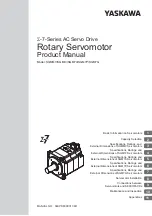
Kollmorgen - June 2014
371
MMC Smart Drive Hardware Manual
-
460V MMC SMART DRIVE DC BUS SHARING
Appendix A- 460V MMC Smart Drive DC Bus Sharing
A.1
Introduction
This section discusses DC bus sharing among 2 or more 460V Smart Drives.
DC bus sharing accomplishes 4 things:
•
It pools the capacitance of all of the drives.
•
It lowers electricity cost.
•
It allows multiple dries to share one shunt resistor.
•
It allows the shunt energy to be shared among multiple shunt resistors.
Pooling the capacitance increases the Joule energy absorption capability to the sum
of the drives connected (
). This lowers energy cost slightly
because energy that can be absorbed is not wasted in the shunt resistors. In some
applications, this can eliminate the need for a shunt resistor altogether.
Many applications will have one drive motoring while the other is regenerating. This
energy is transferred from one drive to the other through the DC bus rather than being
dissipated in a shunt. This saves energy cost.
If it is desired to share one shunt resistor instead of using one per drive, the energy
flows through the DC bus to the drive controlling the shunt resistor. Its internal circuitry
will turn the shunt on when the bus voltage reaches an upper limit.
If it is desired to distribute the shunt load among multiple drives, each having a smaller
resistor, then
it is important to interconnect the “Shunt On” signals for all drives
sharing the DC bus
. This ensures that all of the shunt resistors will properly share the
load. If this connection is not made, it is likely that only one shunt resistor will dissipate
all of the shunt power, overheating it.
A.2
DC Bus Sharing with AC Power to All Drives
When sharing DC power among several drives with AC power supplying all of the
drives (
), all drives must be the same size (for example, all drives must be
MMC-SD-4.0-460). When two drives are connected to a shared DC bus in this
manner, the combined energy absorption of all drives is available.
3% line reactors are required for all sizes using this configuration to ensure rectifier
balance. However, shunt resistors are optional (see below). Refer to Chapter 4 in this
manual for information related to fusing, line reactors and shunts. Refer to Chapter 6
for connector information.
When more than one shunt is used with the MMC Smart Drives, it is important to tie
the “Shunt On” circuits together so that all shunts get turned on at the same time. For
example, in
, if the shunt connected to Drive 1 turns on, the “Shunt On”
signal will turn on the shunt for Drive 2. The second shunt resistor is optional as long
as the “Shunt On” signal is connected as shown. The “Shunt On” signal acts as both
an input and an output for each Drive.
Summary of Contents for MMC Smart Drive Series
Page 2: ......
Page 10: ...8 Kollmorgen June 2014 MMC Smart Drive Hardware Manual TABLE OF CONTENTS...
Page 14: ...12 Kollmorgen June 2014 MMC Smart Drive Hardware Manual INTRODUCTION TO THE MMC SMART DRIVE...
Page 164: ...162 Kollmorgen June 2014 MMC Smart Drive Hardware Manual 460V 3 PHASE MMC SMART DRIVE NEXTGEN...
Page 286: ...284 Kollmorgen June 2014 MMC Smart Drive Hardware Manual S200 DLS DRIVE Figure 9 1...
Page 316: ...314 Kollmorgen June 2014 MMC Smart Drive Hardware Manual MOTOR CABLES CONNECTORS...
Page 368: ...366 Kollmorgen June 2014 MMC Smart Drive Hardware Manual DECLARATIONS OF CONFORMITY...
Page 369: ...Kollmorgen June 2014 367 MMC Smart Drive Hardware Manual DECLARATIONS OF CONFORMITY...
Page 370: ...368 Kollmorgen June 2014 MMC Smart Drive Hardware Manual DECLARATIONS OF CONFORMITY...
Page 371: ...Kollmorgen June 2014 369 MMC Smart Drive Hardware Manual DECLARATIONS OF CONFORMITY...
Page 372: ...370 Kollmorgen June 2014 MMC Smart Drive Hardware Manual DECLARATIONS OF CONFORMITY...
Page 384: ...MMC Smart Drive Hardware Manual INDEX 382 Kollmorgen June 2014...
Page 386: ...384 Kollmorgen June 2014 MMC Smart Drive Hardware Manual SALES AND SERVICE...














































